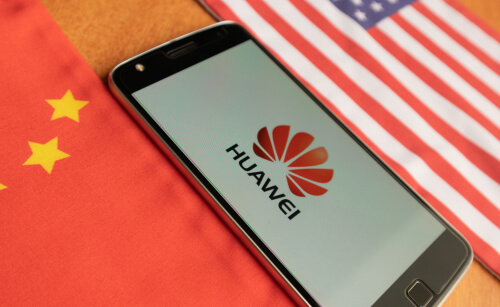As a journalist for decades, I've read through thousands of press releases—but I've never seen one quite like this.
Huawei, the Chinese telecom giant that is banned from doing business with the U.S. government over security concerns, just went off on its critics.
It got personal and specific.
In a post titled Media Statement Regarding Reported US DoJ Probes into Huawei, the company sounds like a kid at school who has been taking punches from a bully and then decides they're not going to take it anymore.
And we're not judging here. It's simply the feeling you get from reading the statement.
What does Huawei say about the U.S. Department of Justice?
Here is a look at the part of the Huawei media statement where it unloads frustrations on the United States government:
"For the past several months, the US government has been leveraging its political and diplomatic influence to lobby other governments to ban Huawei equipment. Furthermore, it has been using every tool at its disposal – including both judicial and administrative powers, as well as a host of other unscrupulous means – to disrupt the normal business operations of Huawei and its partners. These include:
- Instructing law enforcement to threaten, menace, coerce, entice, and incite both current and former Huawei employees to turn against the company and work for them
- Unlawfully searching, detaining, and even arresting Huawei employees and Huawei partners
- Attempting entrapment, or pretending to be Huawei employees to establish legal pretense for unfounded accusations against the company
- Launching cyber attacks to infiltrate Huawei's intranet and internal information systems
- Sending FBI agents to the homes of Huawei employees and pressuring them to collect information on the company
- Mobilizing and conspiring with companies that work with Huawei, or have a business conflict with Huawei, to bring unsubstantiated accusations against the company
- Launching investigations based on false media reports that target the company
- Digging up old civil cases that have already been settled, and selectively launching criminal investigations or filing criminal charges against Huawei based on claims of technology theft
- Obstructing normal business activities and technical communications through intimidation, denying visas, detaining shipment, etc
The fact remains that none of Huawei's core technology has been the subject of any criminal case brought against the company, and none of the accusations levied by the US government have been supported with sufficient evidence. We strongly condemn the malign, concerted effort by the US government to discredit Huawei and curb its leadership position in the industry."
What caused Huawei to issue this statement?
In a company that's been under fire for a while now, this likely is what corporate leadership has been feeling for some time. So why spill it out right now?
It appears an article in The Wall Street Journal over the U.S. Labor Day weekend set the company off.
The article focuses on a smartphone camera developer who is accusing Huawei of stealing his design.
We won't get into that here, but it is another thing that makes this press statement unusual. It spends six paragraphs getting very personal and essentially calling the accuser in the article a liar. Read it for yourself, if you'd like.
Does Huawei steal intellectual property?
We have no idea what happened in the smartphone camera case mentioned above. But let's look at the bigger question of whether Huawei steals intellectual property (IP).
We have written about the 8 Steps Huawei Took to Steal IP from T-Mobile and Cover It Up. And court documents in that case revealed the following:
"On July 10, 2013, Huawei China launched a formal policy instituting a bonus program to reward employees who stole confidential information from competitors.... A 'competition management group' was tasked with reviewing the submissions and awarding monthly bonuses to the employees who provided the most valuable stolen information. Biannual awards were also made available to the top three regions that provided the most valuable information. The policy emphasized that no employees would be punished for taking actions in accordance with the policy."
Huawei denied stealing IP then, and continues to deny it now.
The company's latest press statement repeats that theme with its final two sentences:
"Huawei has invested heavily in R&D for more than 30 years. We have more than 180,000 hard-working employees around the globe. We have won the trust and support of our customers, suppliers, and partners. This is the source of our company's success. No company becomes a global leader in their field through theft."
There is more to come on this story, we're sure.
[RELATED: Cyber Attack Motivations: Russia vs. China]




